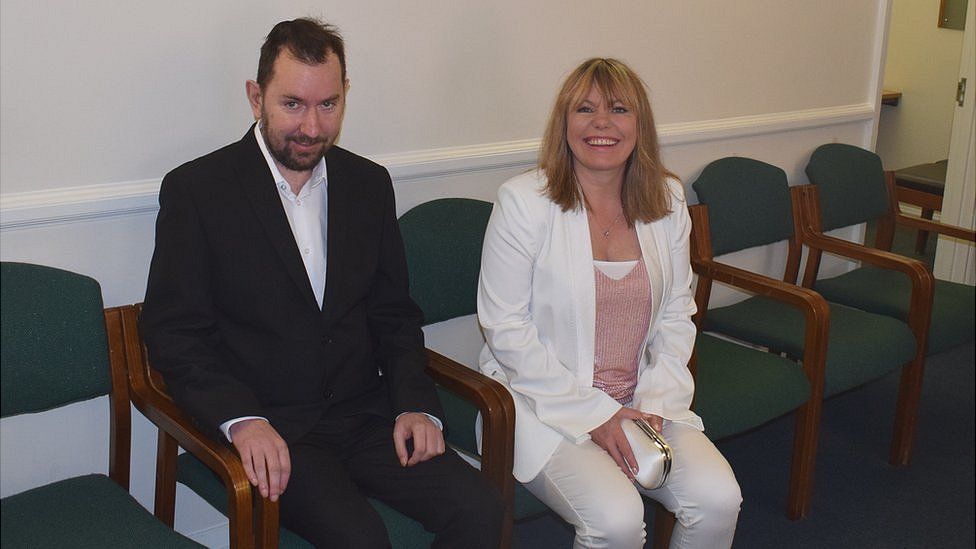Family plea to 'take action' over ambulance delay deaths
- Published

Christopher Hart pictured with his sister, Sheena Clements
The sister of a man who died waiting more than eight hours for an ambulance is calling on the government to "take note and take action".
Christopher Hart, 50, was found lifeless in his home in Woodbridge, Suffolk, by his mother, in October 2022.
His emergency call, made at 01:00 BST, was graded Category 2, meaning an average wait time of 40 minutes.
The Department of Health said ambulance response times had since improved.
Mr Hart's sister, Sheena Clements, told the BBC: "Losing a family member for anyone is hard, it's emotional, especially if you know things could have been different.
"The cardiologist said if he'd had the medical attention, he would have had a chance of surviving of between 93% and 97%.
"He had a heart condition and needed a stent."
She added: "All we want is for the government to take notice and do something about it".
East of England Ambulance Service vehicles queuing up outside a hospital
A Prevention of Future Deaths report, external (PFDR), by the Suffolk coroner, Nigel Parsley, concluded that "due to high service demand, and ambulances waiting to off-load their patients at the local hospitals, no ambulance was immediately available."
It added: "The delay in an ambulance attending meant that potentially life saving treatment could not be given, so that delay directly contributed to Christopher's death."
Mr Hart called an ambulance at 01:00 on 25 October 2022 after becoming unwell.
It was graded as Category 2 and should have meant an average wait time of 40 minutes - and a target wait time of 18 minutes.
The ambulance did not arrive until after Mr Hart's mother discovered her son's lifeless body at 09:25. He was pronounced dead at 09:35.
The coroner added that "had an ambulance for Christopher arrived within the target time, the drugs he could have been given by ambulance personnel, and his early transport to hospital, would, on a balance of probabilities, have saved his life."
The government says "no one should have to wait longer than necessary for urgent and emergency care"
Mrs Clements described her brother as "a kind man, who was well-read and loved his movies and music."
She said their father had passed away 26 years earlier from a heart condition - but her brother's condition was undiagnosed.
The Department of Health (DHSC) said that "no one should have to wait longer than necessary for urgent and emergency care", adding that responses to Category 2 incidents were almost 20 minutes faster compared to last year.
According to NHS England statistics, ambulance response times in the East of England have improved by 30 minutes.
However, on 9 November, coroner Mr Parsley said he heard evidence from a patient safety officer at the East of England Ambulance Service Trust (EEAST) that "despite previous measures put in place, there are continuing and regular instances of non-availability of ambulances occurring in Suffolk and the wider East of England region".
A spokesperson for the EEAST said: "Our response times have improved due to work to increase the number of frontline staff and available ambulances, but we recognise there is a lot more work needed by us and our partners to improve our response to patients."
Coroners' concerns
Analysis by the BBC has found coroners have raised concerns regarding delays to East of England ambulances - or patients dying after waiting in the back of ambulances outside hospitals - on seven separate occasions since January 2023.
Anyone written to by a coroner is supposed to reply within 56 days to say what action they will take to prevent further deaths.
It is part of the legal process and helps promote change - but that process isn't always followed by the government.
On four occasions where coroners in Norfolk wrote to the Secretary of State regarding ambulance delays, a reply was not received.
In the worst breach, the Department of Health failed to meet the deadline by 269 days.
The Norfolk coroner's office confirmed an extension had not been applied for in any of the cases. The Department of Health did not comment on this point.
"People die every day but if simple measures can save someone's life then we should be doing that," Mrs Clements said.
"Bereavement's hard, but if you know something simple could be done to save your loved one's life then it makes that bereavement process so much worse."
She said she did not blame the ambulance service for her brother's death.
Unison branch chairman Glenn Carrington says he is anxious about winter pressures
Unison branch chairman for the EEAST, Glenn Carrington, said the solution was about making sure people could be cared for in the community so that hospitals could free up beds and ambulances would not be left waiting to offload patients.
"Winter pressures are kicking in and we need to make sure response times don't deteriorate," he said.
"When the time starts elapsing because you can't get to someone, we know their outcomes will be worse - and that really gets to us."
The DHSC added: "We are providing an additional £800m for this winter to support the NHS.
"We are also working to get 800 new ambulances on the road and create 5,000 permanent staffed hospital beds to further reduce waiting times."
Follow East of England news on Facebook, external, Instagram, external and X, external. Got a story? Email eastofenglandnews@bbc.co.uk or WhatsApp 0800 169 1830
- Published24 November 2023
- Published23 August 2023
- Published30 January 2023
- Published4 January 2023
- Published21 November 2022